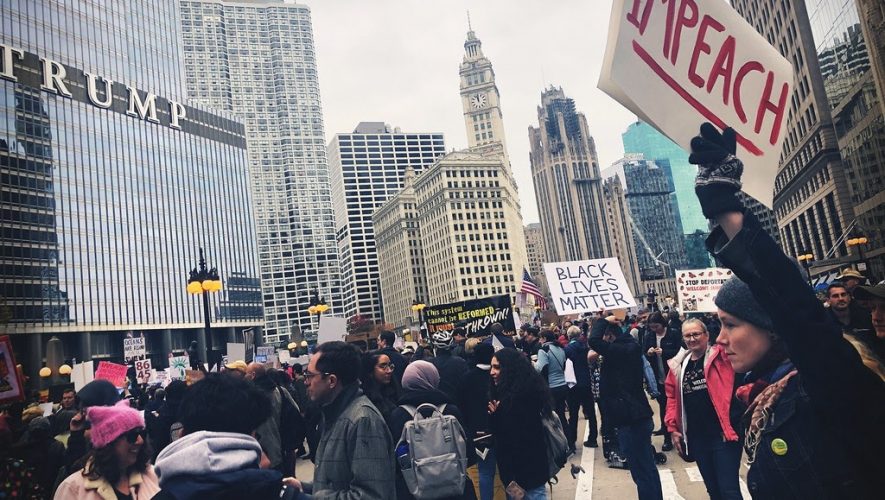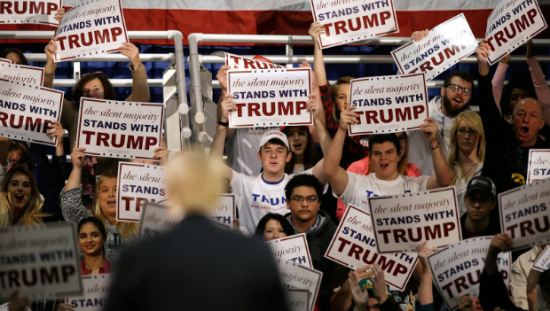Despite President Trump’s approval rating sitting at 44 percent as of March 20, 56 percent of Americans—including 65 percent of independents and 93 percent of Democrats—disapprove of his administration. Even the number of Republicans supporting the president has fallen by two percent since January, when the president’s approval rating peaked at 49 percent.
Yet toppling an incumbent in a primary is considerably difficult, especially when the economy has felt like it has improved for most of the term and the president has deep ties with their base like Trump does (62 percent of his base supports him unconditionally). That said, there was room—albeit limited—for a challenger to impact the outcome. Splitting a ticket during a primary impacts the general election by reminding voters that they can elect another candidate, showing that the incumbent is not unchallengeable. Even former White House strategist Steve Bannon stated that Trump’s reelection “is not in the bag” and that if he were to lose three percent of the traditional Republican vote, his 2020 campaign would fail.
Due to Trump’s overall unpopularity, multiple Republicans launched primary challenges. The last time a president faced significant internal opposition was in 1992, when populist Pat Buchanan ran against President George H.W. Bush. Every time a president faced primary opposition—which has occured six times—they failed to win reelection. The public largely ignored Trump’s three primary challengers, all of whom represent distinct subsects of the party and reject Trump’s tactics for one reason or another.
Former Illinois Representative Joe Walsh announced his candidacy on August 25, 2019 on social media. Despite advocating for the Trump campaign in 2016, Walsh described the president as “morally unfit” for the position after the Helsinki Summit between Trump and Russian President Vladimir Putin, where Walsh and other conservatives believed Trump to be disseminating Putin’s propaganda. Walsh was convinced Trump had been involved in nefarious and even criminal activity. “The [Republican] party has become a cult . . . Donald Trump is a dictator, he’s a king. He literally is the greatest threat to this country right now. Any Democrat would be better than Trump in the White House,” Walsh asserted.
After receiving only one percent of the vote in the Iowa Caucus, Walsh ended his campaign. He’s since stated that he would rather have Bernie Sanders—a Democrat he doesn’t agree with on any policy issue—in the White House over a dictator.
Former South Carolina Representative Mark Sanford announced his primary challenge on September 8, 2019. Running on a platform of extreme fiscal conservatism, Sanford criticized the Trump administration for skyrocketing national debt. His campaign focused little on Trump’s conduct; consequently, his message failed to resonate with Republican voters, most of whom dislike the president’s behavior more so than his policies. In November, Sanford’s campaign ended. He lamented that impeachment’s dominance over Republican politics made his goal of “making the debt, deficit, and spending issue a part of this presidential debate impossible.”
Bill Weld ran the longest and most successful campaign of the challengers, beginning on March 15, 2019 and centering on contrasting the president’s lacking qualifications with Weld’s ample experience and credibility. Weld suspended his campaign on March 18, 2020, vowing to uphold his “commitment to our nation and to the democratic institutions that set us apart.”
On the surface, Weld and Trump seem to have the same background: Both are New Yorkers from wealthy families and both graduated from Ivy League colleges. But their similarities end there. Unlike Trump, Weld has immense political experience. Weld began his career as a junior counsel in the US House Judiciary Committee during President Richard Nixon’s impeachment. He served as US attorney for Massachusetts, where he prosecuted New England’s largest banks for money laundering and the municipal government for corruption. The Boston Globe called him “by far the most visible figure in the prosecution of financial institutions.” In 1986, Weld became the head of Ronald Reagan’s Criminal Division of the Justice Department in Washington D.C. Two years later, he resigned to protest US Attorney General Edwin Meese, who was accused of corruption.
In 1990, Weld ran as a Republican for governor of Massachusetts. Due to his progressive social views and promises to reduce the deficit, lower unemployment, and cut taxes, Weld won the election with 50 percent of the vote, becoming the state’s first Republican governor since 1975. In office, Weld promoted progressive norms by recognizing domestic partnerships, making abortions more accessible, instituting protections for gay students, and expanding Medicaid. Meanwhile, The Wall Street Journal and the Cato Institute ranked him the most fiscally conservative governor. By meeting his campaign promises, Weld won reelection in 1994 with 71 percent of the vote.
Weld also has substantive experience in foreign affairs. As governor, he led sixteen trade missions around the world, establishing Massachusetts as a hub for education, technology, and business. In 1994, Weld worked with Bill Clinton and Newt Gingrich to craft the North American Free Trade Agreement. Since then, Weld has served as an active member of the InterAction Council and the Council on Foreign Relations.
Trump and Weld disagree on the role of government and on the principles of conservatism. As evidenced by his “make America great again” mantra, Trump believes the government should be seized and used, rather than diminished. Conversely, Weld does not tout a rightist ideology, but rather a conservative sensibility in which right-wing reforms are supported, but not at the expense of stability or the risk of a ballooning deficit.
Weld has a long history of bipartisanship. He not only endorsed former President Barack Obama in 2008 and Democratic candidate Hillary Clinton in 2016, but also worked to diminish polarization between the parties. His gubernatorial campaigns centered on his personal policies rather than the GOP platform, established an independent base, and persuaded the opposition to engage with his agenda, which prioritized organizational efficiency.
The candidates also diverge on foreign policy; Weld advocates a “stable, bipartisan” system which prioritizes cyber and infrastructure security, free trade, and multinational climate agreements. Trump has pursued and poorly implemented protectionist foreign policy. For example, Trump’s misapplication of quotas—quantitative restrictions on goods—failed to increase tax revenues and raised the price of products, burdening the American consumer. The policy benefitted foreign companies more than domestic ones.
Trump believes trade is dictated by leverage and power, not by economic principles. Throughout his administration, Trump has threatened to implement tariffs—taxes on imports—which provide none of the economic benefits of an actual tax. Rather, the threat of tariffs promotes stockpiling and economic volatility as domestic manufacturers hesitate to invest in new jobs and infrastructure. Weld focuses on the economy of the future by prioritizing industries such as artificial intelligence while emphasizing accessible job retraining. Trump fails to realize that tariffs cannot and should not revive industries of the past.
If he were running in any other election year, Weld could be a prime candidate. But running against an incumbent president—particularly one with so much cultish clout—has been deemed futile. Weld struggled to gain name recognition and run a successful campaign because the ever-burgeoning Tea Party sect of the Republican Party—and, by extension, GOP elected officials—has not given him financial or political support.
The threat of retaliation from Trump—whether through Twitter or withholding endorsements—has kept Republican candidates in line. Despite his countless racially insensitive remarks on Twitter, it was his bid for the Republican primary that cost Joe Walsh his national radio show. Trump also threatens retaliation against any GOP congresspeople who vote against his interests, as is illustrated by his continual attacks on Senator John McCain for voting against the 2017 GOP healthcare bill. The president’s harassment is not limited to elected officials; after Fox News anchor Megyn Kelly questioned his treatment of women, Trump constantly attacked her and her reputation, contributing to her departure from Fox News.
Due to this retaliation on critics in Congress and the news, it was difficult for Weld to gain any recognition from GOP members (elected or otherwise) and right-leaning media. Additionally, Trump has changed the fundamental belief system of the GOP, not only in terms of what social views are acceptable, but also in terms of economic policy. His promotion of populist policies has shifted the party away from free trade and limited government spending. It has normalized racist rhetoric and left the GOP’s base substantially more xenophobic than it was during the Obama administration.
Trump also used his influence as the head of the GOP to pressure leaders of the Republican state committees to cancel primaries. Minnesota listed only Trump on its primary ballot; contests in pivotal states such as South Carolina, Nevada, Arizona, and Kansas were canceled altogether. Andrew Hitt—chairman of the Republican Party of Wisconsin—attempted to justify excluding Weld on the ballot, arguing that he did not need to be on the Wisconsin ballot if he was not on the ballot elsewhere.
Despite all this, Weld did surprisingly well. In the Iowa Caucus, Weld took one delegate. In the New Hampshire Primary, he received almost 10 percent of the vote, with 12.5 percent in Concord, 17 percent in Portsmouth, and over 30 percent in Hanover. In total, Weld received a higher percentage of votes than former Vice President Joe Biden. On Super Tuesday, his best performances occurred in New England. In Vermont, after being endorsed by Governor Phil Scott two weeks prior, Weld received 10.4 percent of the vote. In Massachusetts, he received 9.3 percent of the vote. Conversely, in Texas, Tennessee, and Alabama, Weld received 0.8, 1, and 1.5 percent respectively.
These numbers were not enough to beat Trump. However, Weld’s goal was not to become president. His motivations for running were far nobler: to remind Republicans they have a choice. This made Bill Weld the perfect challenger to Trump; he is everything the president is not. Where Trump is uninformed, Weld is knowledgeable. When Trump is vulgar, Weld is composed. While Trump is a conservative in the most oppressive ways, Weld empowers his constituents to pursue their personal and professional autonomy.
Nothing proved Weld’s intentions more than his interview with Boston: “If Mike Bloomberg had chosen to run as a Republican, I would have stepped aside for him. But that candidate would have to be a Republican, because I am running, on purpose, against Mr. Trump in the Republican primary.”
Weld’s challenge shows that not all Republicans have fallen into step with Trump. The president’s anti-democratic reforms are not representative of all members of the GOP, particularly moderates and those who consider themselves to be classically conservative or New England Republicans. Both terms allude to modest socially progressive and fiscally conservative values that do not always align with the Libertarian Party’s radical anti-government stances.
The future of the Republican Party rests in the hands of elected officials and their ability to speak against Trump. Yet, many elected officials have been forced to choose between falling in line with the administration or retiring. Since Trump was elected, 40 percent of Republican members of Congress have either stepped down or been defeated at the ballot box.
Fellow former governor of Massachusetts and 2012 Republican presidential candidate Mitt Romney criticized the Trump administration on numerous occasions. During the impeachment trial, he and Maine Senator Susan Collins were the only GOP senators who voted to hear former national security adviser John Bolton’s testimony on Trump’s solicitations of foreign interference in the 2020 election through withholding aid to Ukraine. Romney was also the only Republican senator to vote against the president’s acquittal and to condemn him for corrupt actions. In response, Trump labeled him a “pompous ass.”
Unless more established, nationally recognized GOP members join Weld, Romney, and the numerous Republicans who left office because of Trump’s election, the GOP’s platform will grow more distorted. The party will lose its legitimacy, propagate even more discriminatory policies, cultivate a growing deficit, and destroy democratic norms that have stabilized the United States for centuries.
The Republican Party will never be the same; the Trump administration has already tarnished it. If our congresspeople choose power over speaking out against the man they once opposed, how can they be trusted to represent our interests in other moments of political strife?
The importance of the Republican primary is not only to remind voters that they have a choice, but also to remind office holders that they have the power and responsibility to challenge those in office who fail to uphold the constitutionally mandated priorities of the United States: equality, individualism, liberty, and—most importantly—protection from autocracy in favor of popular sovereignty.



